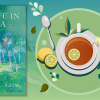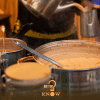Do we overly romanticise drinking tea?

Cardamoms, cloves, cinnamon, peppermint, ginger, saffron – as you wait for the contents to come to a boil, the aroma of fresh spices wafts from the pot... Are you even Bangladeshi if the memory of that aroma doesn't make your heart flutter and you can't taste the drink right off the page? It's no secret that we Bangladeshis love our tea. Cha-er-adda (tea sessions) is an integral part of our culture.
Growing up, I was introduced to the concept of drinking tea several times a day by watching my elders do so. My grandmother would say, "If you can't make good tea, you can't be a good cook."
Colourful and flavourful tea bags are now staples in households and restaurants, with the growing aesthetic appeal of motka cha and tandoori cha following closely. In fact, there are more tea stalls than restrooms on our highways, which speaks for itself. Whether it's a break amid daily chores or a reading retreat to the balcony on a rainy day, tea is always company.
We have romanticised the idea to the point where it feels like a toxic relationship we can't let go of. Overlooking the ornaments, we must acknowledge the harmful implications of overconsuming tea on our mental and physical health. As a tea addict who went from drinking mugs full of tea throughout the day to only one cup per day, I can vouch for its adversities. Tea contains caffeine, which can lead to anxiety, nervousness, and even panic attacks. Ironically, I used tea as a coping mechanism, which landed me in bad shape.
Caffeine is a stimulant that can change the chemistry of our brains and make us feel jittery or restless. If you're a night owl like me who associates tea with creative stimulus, know that it does nothing specific other than keep your brain abuzz. I felt the full brunt of withdrawals when I started letting go and having overwhelming mood swings. Excessive tea can cause tooth staining and bad breath. The high sugar content of tea may cause weight gain. It can also dehydrate us and disrupt our sleep patterns, resulting in insomnia.
To cut down on tea, consider replacing it with other healthy beverages such as lemonade, homemade ginger ale, fresh juices, coconut water, and more water. Certain caffeine-free herbal teas, such as peppermint and chamomile, are thought to have calming effects that lead to better sleep, but using any substance, tea or otherwise, to induce sleep is harmful. If you find it difficult, try switching to green tea, sugar-free light liquor, or black tea (rong cha) instead of milk tea.
Albeit with a heavy heart, start rethinking your relationship with tea. While it's certainly a beloved beverage, you must acknowledge its potential hazards. As with all things in life, moderation is key. Do not let your nostalgia overshadow your health. Old habits die hard, but making small adjustments now can secure you in the long run.
Spill the tea with Joyeeta at Instagram.com/smolbabyjo

 For all latest news, follow The Daily Star's Google News channel.
For all latest news, follow The Daily Star's Google News channel. 








Comments